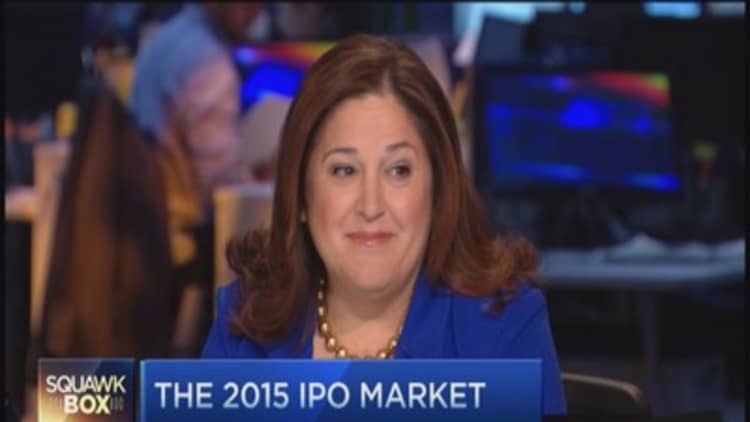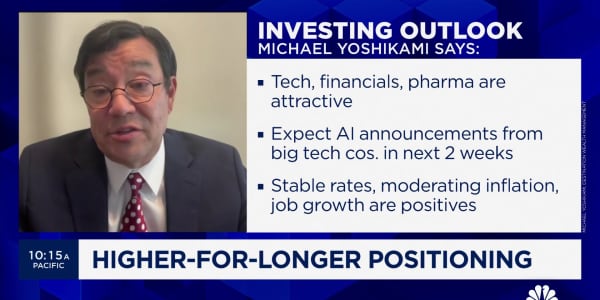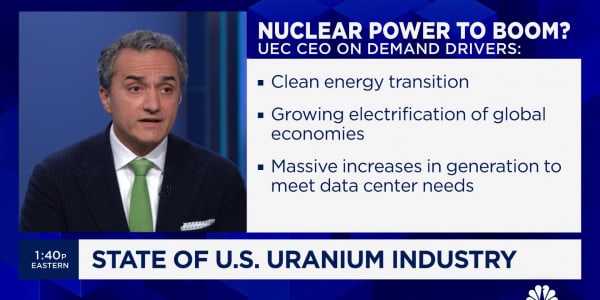It's boom time for private equity.
Deals are happening virtually daily. Money from pensions, ultrawealthy families and other investors is pouring in. Credit is cheap, making levered purchases of companies relatively easy. And businesses are being sold by PE firms at lucrative prices.
All that makes the industry optimistic for more.
"We are seeing positive indications for a strong 2015," Steve Judge, head of the Private Equity Growth Capital Council, the industry's main trade association, said in a recent statement. "Within both the private equity environment and the broader economy, there is enthusiasm for investment and putting capital to work in the coming year."
Read More
It's easy to see why investors are bullish.
In 2014, PE funds invested nearly $1 trillion over 5,305 deals, the highest total since 2007, according to data tracker PitchBook. Funds also netted a record $445.7 billion on their 1,671 "exits" of companies through a sale or initial public offering, up 46 percent from 2013. And PE funds still have about $750 billion in so-called dry powder—cash on hold to spend—today.
"We expect 2015 to be even more active for private equity investors as they continue to adapt to these conditions and the tail winds of significant dry powder, active M&A market and recovering economies help drive deals," Adley Bowden, senior director of analysis at PitchBook, said in a recent statement.
Industry players are tracking activity closely to see if private equity lives up to the optimism. CNBC.com asked PE experts for important themes to watch in 2015 and below are key questions and observations for the year ahead.

Read MoreSchwarzman: Energy a 'wonderful' opportunity
Is there too much easy money?
"We've certainly seen leverage multiples creep up, particularly in many of the larger positions," said Andrea Kramer, head of PE investor Hamilton Lane's global fund investment team. "I'd be curious to see if there are cracks in the system over time and what that buying opportunity will mean for many of our credit or distressed investors."
Could companies get hit?
"Increased volatility in interest rates, foreign exchange rates and commodity prices will likely catch some levered companies by surprise," said Jason McGann, a director for PineBridge Investments' private funds group. "The extent of the distress in the energy space will depend on how long oil prices continue to decline and how long they remain depressed versus recent highs."
When will the next distressed investment cycle begin?
"The last wave was the financial crisis in '08, '09—you had that from all the excesses of '06, '07. Similarly, if you look at the number of bond and loan deals since 2011, we're starting to peak here in '14," Jeff Davis, a partner at private equity fundraising firm Eaton Partners, said in noting recent fundraising for new distressed-focused private equity funds. "We expect there's going to be an increased level of defaults in '15, '16, '17. I think it's a great time."
Still plenty to invest in?
"We've seen pretty active investment pipelines across the board," said Gabrielle Zadra, head of the private assets research team at investment consultant Cliffwater. "The managers report that they're finding high-quality companies. Even though the pricing may be high, it's not to a point that makes it unattractive because the companies fundamentally have good growth prospects."
Will pensions keep up their PE love affair?
"PE allocations generally are at great levels," said Davis of Eaton. "Pension funds will continue to drive those allocations as so many are more comfortable these days with increased risk and taking exposure to private equity to meet those long-term liabilities."
Will PE funds take in too much cash?
"When performance is good, GPs sometimes convince themselves that taking on excess capital is OK, but in many cases history tells us it's not. It's definitely a major red flag for the asset class," noted Susan Long McAndrews, a partner at fund investor Pantheon (GP refers to general partners, who manage private equity funds for clients, known as limited partners or "LPs").
Will clients keep winning on fees and transparency?
"Transparency and fees will continue to get scrutiny," said McAndrews. "Many LPs and boards are getting fatigued by it. The big managers would be wise to just focus on creating capital gains and not cling to incremental fees."
The trend is already on the right path, according to McAndrews, "Disclosure is moving in the right direction—managers have gotten the message."
Will PE funds keep the good returns flowing to clients?
"We're pretty optimistic in terms of distributions keeping pace," said Zadra of Cliffwater. "Even if you look at the number of private equity-backed companies that went public last year—as long as the market stays fairly healthy—there's quite a bit of liquidity that can be cashed out through secondary and follow-on offerings."
"There's a lot of companies that are ready to do debt recapitalizations that have been performing well," Zadra added. "Particularly in the U.S., it just seems like there are a lot of healthy portfolios out there."
Read MorePrivate equity bets on 'revolution'-in oil and gas
Are there still decent investment opportunities in the U.S.?
"Will the U.S. continue to be [an] interesting place to invest in 2015? My answer is yes. People felt that values were sustained over the last year and a half, and frankly exits happened," said Kramer of Hamilton Lane. "The U.S. markets may have a little bit more runway—2015 will continue to be a place where they'll both look to exit as well as invest."
Will PE funds shift from developed to emerging markets?
"With valuations in developed markets rising due to competition and increases in the valuations of publicly listed comparable companies, LPs will increase allocations to emerging markets to take advantage of better valuations and more favorable growth dynamics," said McGann of PineBridge.
He noted improved valuations and increased buyouts in Asia; positive economic reforms that will help to grow smaller businesses in Latin American countries like Mexico, Peru, Chile and Colombia; and opportunities related to infrastructure and consumer products in Africa.
"Declines in emerging market stock markets and foreign currency rates present an attractive entry point to acquire emerging and frontier market assets," McGann added.






